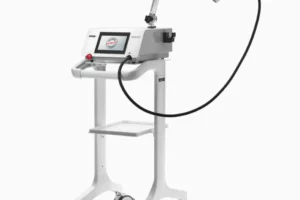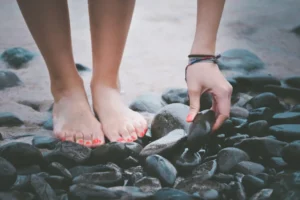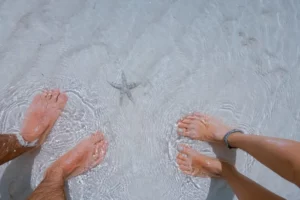What is a Verruca?
Verrucas are small, rough benign lesions which are usually found on the sole of the foot. They are often referred to as plantar warts. They can take on many different forms. They can be: spread over the surface of the skin, raised with a mosaic appearance, painful with hard skin, or multiple lesions that occur across the foot. These various manifestations are divided into many subtypes. A verruca can be painful or non-painful, depending on the type and location. Verrucae are associated with both children and adults, and are contagious in the right host environment.
What Causes a Verruca?
Verrucas are caused by infection from differing strains of the Human Papillomavirus (HPV) which infects the skin’s cells. Plantar warts are a group of the HPV subtypes found on the bottom of the feet. The HPV virus enters the body through cuts or abrasions on the skins. It will then use the healthy skin cells to replicate and develop. The process changes the skin; the different layers become disturbed causing hard skin and trapped blood which is often observed as black dots.
Myth Buster: “Verrucas occur due to a weakened immune system”
Verrucas DO NOT occur due to a weakened immune system. Instead, the virus cleverly creates its own immune resistance through the body’s cells. This is why warts can be long-standing and challenging to treat. However, those individuals who are immunocompromised due to drug treatment such as chemotherapy will have an increased risk of all types of infection including HPV.
Treatment Options
In 65% of cases verrucas and warts will spontaneously resolve within two years without treatment. However for those that remain the average time to resolve is 8 years in adults.
There are several treatments available for the treatment of Verrucas and Warts which vary in effectiveness. Below is an overview of current treatment options starting with most effective according to research.
- Microwave Therapy using SWIFT
Microwaves are a form of non-ionising radiation, which does not destroy DNA. The Swift machine applies a low grade amount of energy to the infected tissues through a probe, just enough to stimulate the water molecules in the skin cells. This then causes localised heat, which creates an immune response and eradicates the verruca. This form of radiation is delivered at much lower levels than most electromagnetic energy forms. It is also less harmful than most laser and electrocautery treatments. The efficacy of this treatment is 80% resolution after 12 weeks of a course of 3 treatments carried out a month apart. This is the highest resolution rate of all the treatments.
- The Verruca Needling aka Falknor’s Needling
This treatment involves repeatedly applying pressure to an area with a needle to push the verruca into the tissue below. Exposing the virus to soft tissue is said to produce a more sophisticated immune response. The procedure requires a local anaesthetic injection to numb the area, or the foot, depending on the location of the lesion. It is often performed when there are multiple verrucae because research has shown that once one lesion is recognised by the immune system, all tend to resolve. This is preferred to chemical treatment because it has a higher resolution rate, and does not require regular application. The efficacy of this treatment is 70% resolution within 6 months of the procedure according to the research.
- Cryotherapy
Cryotherapy aims to destroy the skin cells which are infected by the verrucas by freezing them. The crystals form within the cell and rupture the membrane causing the infected cell to die. Different cryogenic treatments will achieve lower temperatures of freezing, for greater cell destruction. A common treatment is liquid nitrogen which will freeze tissues to -196०. However, other cryogenic agents will operate to less extreme temperatures because it is unknown whether it is the rapid freezing or thawing which causes the cell destruction. This treatment can be painful and leave scarring. Typically cryotherapy is administered every three weeks until resolution with a maximum of 6 treatments and is effective in around 50-70% of people, however there are very few good quality research studies.
- Topical Treatment using Acids & Caustics
The purpose of these treatment options is to provide a destructive action to the skin cells. Salicylic acid will cause maceration and separation of the skin to encourage tissue breakdown and an immune response. Both Salicylic Acid and Silver Nitrate will create skin cell destruction which can then be filed away by a Podiatrist. These agents are usually consistently applied 3 weekly for up to 12 weeks to encourage tissue breakdown and have a resolution rate comparable to cryotherapy of around 50%. However, similar to cryotherapy the research studies are of low quality.
- Occlusion Therapy (at home).
Placing tape over the verruca will prevent water loss from the skin. The most common tape used is Zinc Oxide because it is strong and durable. Trapping water within the skin prevents hardening, creating a reduction in pain. The skin becomes macerated and has a similar appearance to when soaked in a bath for a long period of time. This maceration can change the skin structure and may trigger an immune response. Although there is conflicting evidence regarding the effectiveness of taping, this option is suitable for children because it is less invasive and can relieve pain.
How to Prevent Spread of Verrucas
- Don’t touch other warts or verrucas as they are contagious. If you have to for the purposes of treating, ensure you exercise good hand hygiene afterwards.
- In communal areas of the gym or swimming pool ensure your feet are covered e.g. wear flip flops. This includes when showering.
- When you go swimming, cover any existing verrucas with zinc oxide tape.
- Don’t share towels, socks or shoes with others.
- Don’t scratch or pick your verruca as this increases the chances of spreading the infection.
- If you use a file or any other abrasive tool on the foot, isolate its use to the verruca and do not use it on other areas of the feet.
- Ensure any cuts or abrasions on the feet are covered if you are barefoot in public, including in the swimming pool.
If you would like your advice or treatment for verrucas or warts then please get in touch with our patient care team to book an Initial Verruca Consultation on 01489 881204.



